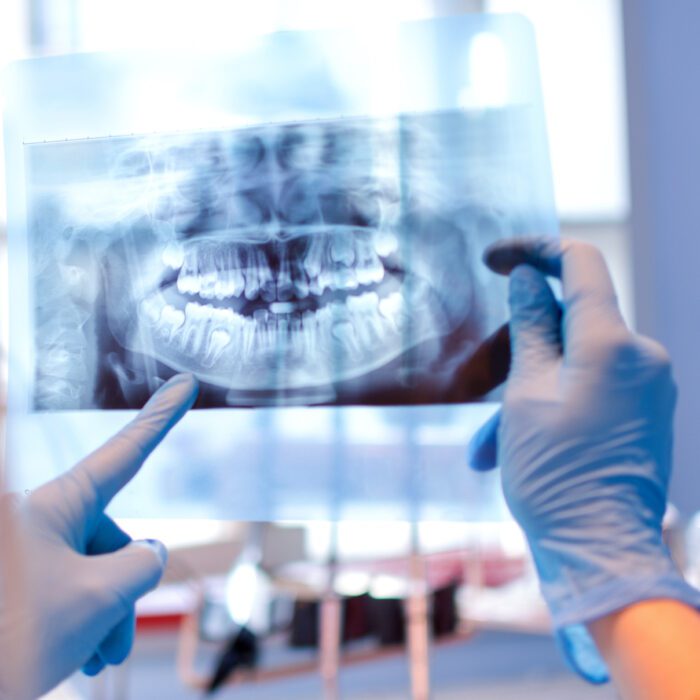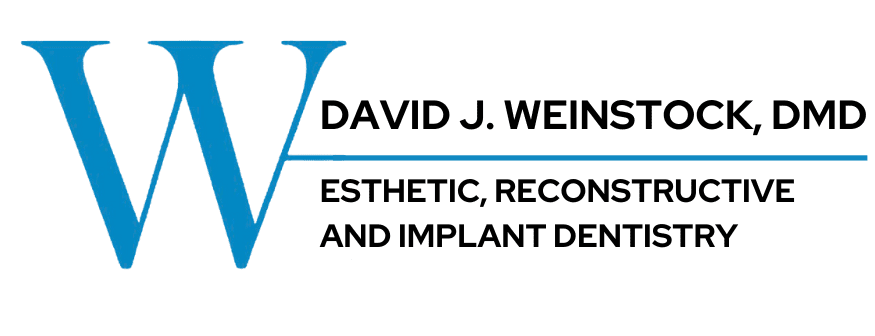Preventive dental care is your best defense against many oral health concerns. Dr. David Weinstock provides general dentistry in Philadelphia, PA, for the health of his patients’ teeth and gums. Our dentist office allows patients to feel relaxed and confident during their appointments. Our dental team works closely with patients to address their dental concerns and help them achieve their cosmetic goals.

General Dentistry Services and Treatments
Dr. Weinstock offers a range of general dentistry services in his Philadelphia, PA office. General dentistry helps to preserve and restore your oral health. To learn more about our general dentistry services, continue reading.
Dental Cleanings
We recommend that patients visit our office for a professional tooth cleaning every six months. This is to ensure that you are taking good care of your teeth at home and to examine your mouth for any signs of cavities or gum disease. During your dental cleaning, our dental hygienist will deeply clean your teeth, leaving you with a shiny, beautiful smile. To learn more about professional dental cleanings, see Dental Cleanings.
Dental Fillings
Dental fillings are used to replace tooth decay and cavities. Tooth decay is a very common issue in patients of all ages. Typically, during the filling procedure, we begin by numbing the area we will be working in. We then remove any tooth decay and fill the cavity with composite resin. The procedure is virtually painless and typically takes between 30 minutes and an hour to complete. To learn more about fillings, see Dental Fillings.
Emergency Dentistry
If you are experiencing a dental emergency, do not hesitate to contact our office. We are equipped to diagnose and treat a wide range of issues, from toothaches to knocked-out teeth. Call us with any questions or concerns you may have regarding dental emergencies. To learn more about dental emergencies, see Emergency Dentistry.
Mouthguards
If you or your child participates in contact sports that require a mouthguard, please contact our office today. We create custom mouthguards that are molded exactly to each patient’s mouth using dental impressions. Custom mouthguards offer better protection for your teeth than store-bought mouthguards. They also allow athletes to speak and breathe better while on the field or court. To learn more about custom mouthguards, see Mouthguards.
Sedation Dentistry
We use dental sedation during extensive procedures or procedures likely to cause discomfort. It may also be used for patients who have dental anxiety. Sedation relaxes patients and makes dental procedures pain-free. To learn more about our sedation dentistry options, see Sedation Dentistry.
Tooth Extractions
If we are unable to save your tooth with a filling or root canal, we will need to extract it and replace it. Tooth extractions may also be used to remove teeth that are impacted or that are causing crowding. If we find that the best option is to extract your tooth, do not worry. It is not uncommon and is the best option to prevent crowding, infection, and future damage. To learn more about dental extractions, see Tooth Extractions.
Periodontal Therapy
Gum disease, also known as periodontitis, attacks and progressively breaks down gum tissue. As the disease progresses, it becomes increasingly more difficult to treat and more likely to cause serious health issues. Treating gum disease early on is crucial to preventing it from causing further health problems, including life-threatening issues such as heart disease. To learn more about gum disease and how to treat it, see Periodontal Therapy.
Patient Review
The Importance of Routine Dentist Appointments
Dr. Weinstock encourages his patients to visit the dentist at least twice yearly for an oral health exam and teeth cleaning. During your exam, he will look for signs of gum disease, tooth decay, oral cancer, and bite problems. Spotting these problems early and offering prompt treatment will help avoid developing complex dental problems.
If left untreated, gum disease, tooth decay, or even oral cancer may cause serious damage to your overall health. Dental checkups help our staff stay on top of any developing concerns, such as decay or receding gums. We will offer the most conservative treatment plan to restore health to your teeth and gums.
One of the main things you can do between your dentist appointments is to maintain good oral hygiene. Taking care of your oral health is a daily, lifetime commitment. It is very important because oral diseases can lead to serious health problems.
Bad oral hygiene is linked to Alzheimer’s disease, cardiovascular disease, respiratory infections, dementia, diabetic complications, and pregnancy issues. To avoid major overall health issues, we recommend brushing your teeth at least twice a day with fluoride toothpaste, flossing once a day, eating a healthy diet, and limiting sugar intake. These habits, along with regular dental appointments, will contribute to a healthy lifestyle.
Healthy Gums, Healthy Smile
Healthy gums are essential for oral health. The gums help to protect the teeth roots as well as stabilize the structure of the bite and smile. When gum disease develops, it can compromise the foundation of your smile. Receding and diseased gums expose your teeth to higher chances of decay, shifting, and even tooth loss. Gum disease is the leading cause of tooth loss. However, you can prevent it with good oral health care habits.
Treating Gum Disease
Dr. David Weinstock is an experienced periodontist specializing in the treatment and care of gum health. Dr. Weinstock uses state-of-the-art dental technology and laser dentistry. He offers minimally invasive and highly effective treatments for gum disease.
Patients who have not visited the dentist in some time are welcome here. The sooner you seek treatment for your gum disease, the better your outcome will be. Dr. Weinstock will address the infections and the damage these diseases cause. He will restore your teeth to help them function normally and feel comfortable again.
Frequently Asked Questions
Read through our section about frequently asked questions about dentistry. If you have further questions, please contact our office. Our helpful staff is available to help you find the answers to your questions.
Can dental cleanings prevent cavities?
Dental cleanings help significantly prevent cavities. They remove plaque and tartar buildup. Moreover, professional cleaning reaches areas you might miss at home. Regular cleanings also allow early detection of potential issues. You should combine cleanings with good home care for the best cavity prevention.
Can dental fillings fall out?
Yes, dental fillings can fall out. They might come loose due to decay around the filling or biting down on hard foods. General wear and tear can also loosen them over time. See your dentist immediately to avoid further damage or infection if your filling falls out. Keeping up with regular dental check-ups can help catch any issues with fillings early.
What if I have a toothache and my face is swollen?
If you have a toothache and your face is swollen, it could be a sign of a serious infection. You should see a dentist as soon as you can. We will diagnose the problem and may prescribe antibiotics to reduce the infection and pain. Lastly, don’t delay treatment of this condition. It can lead to more severe complications, so prompt care is essential.
Does insurance cover mouthguards?
Most insurance plans cover at least part of the cost of mouthguards. Coverage often applies to medically necessary guards, like for TMJ or teeth grinding prevention. Many plans usually don’t cover sports mouthguards. It’s best to check with your insurance provider to see what they include in your coverage. We can also help clarify your benefits.
What are the different levels of sedation dentists use in dentistry?
Dentistry uses three levels of sedation to help patients relax during procedures. Mild sedation, such as nitrous oxide (also known as laughing gas), enables you to relax while remaining awake. Moderate sedation, such as oral or IV medications, makes you drowsy.
As a result, you might not remember much of the procedure. Deep sedation places you on the edge of consciousness, but we can still wake you up if necessary. General anesthesia makes you completely unconscious during the procedure. We will help you choose the appropriate level based on your needs and the type of procedure.
Can you get dental implants if I have gum disease?
Getting dental implants with gum disease can be challenging. Healthy gums and sufficient bone support are important for implant success. If you have gum disease, your dentist will likely recommend treating it first. Once the gum disease is under control and we evaluate the supporting bone, you may be a candidate for implants.
Schedule a Dentist Appointment in Philadelphia, PA
Preventive dental treatments are the best way to keep your gums and teeth in good health. We also offer an array of dental health services for new and existing patients. If you are looking for a new dentist or are ready for your next dental cleaning, contact the Philadelphia, PA dentist office of Dr. Weinstock today.
